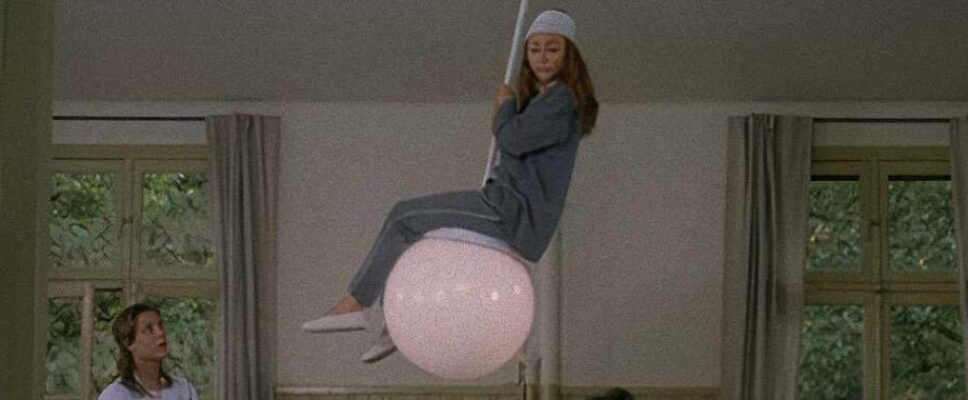Teresa reviews “By The Pricking of My Thumbs”
Teresa reviews “By The Pricking of My Thumbs” (2005) and finds the adaptation of the Tommy and Tuppence novel a grand French fling.
(Mon Petit Doight M’a dit…)
Fidelity to text: 4 stranglers
![]() Pretty darn close, with added unwanted visiting family and the French version of MI5.
Pretty darn close, with added unwanted visiting family and the French version of MI5.
Quality of movie on its own: 4 stranglers
![]() Light, frothy, funny, reasonably tight plot, and gorgeous scenery of the French Alps.
Light, frothy, funny, reasonably tight plot, and gorgeous scenery of the French Alps.
Read more of Teresa’s Agatha Christie movie reviews at Peschel Press.
Also, follow Teresa’s discussion of these movie on her podcast.
As always, I’ll stick with the names in the novel rather than the French film’s changes.

By the pricking of my thumbs,
Something wicked this way comes.
Open locks,
Whoever knocks.
Macbeth, Act 4, Scene 1
Along with the evil, something quite funny comes along for the ride. This was a surprisingly amusing film considering that it’s about the unsolved strangulations of between five and eight children (the novel is unclear and the film didn’t bother spelling it out) and the poisonings of at least two old ladies in rest homes. This novel is yet more proof that Agatha didn’t write cozies.
This was her third Tommy and Tuppence novel, written near the end of her writing life. She published it in 1968, so she wrote it in 1967 when she was 76. She wrote five more novels after this one, including the last Tommy and Tuppence novel, Postern of Fate (1973), which has never been filmed.
By the Pricking of My Thumbs is … interesting. You can tell Agatha’s not the writer she was. A few loose plot ends, like what Aunt Ada saw that got her killed, are never tied up. Like Nemesis (1971) and Elephants Can Remember (1972), it’s an elegy on growing old and a meditation on change. Time makes fools of us all. The sly, witty, pretty girl (Aunt Ada) becomes a bad-tempered old crone, and the young subaltern who loved her (Sir Josiah Penn) is a feeble, deaf old man. They’re part of the tragedies of the novel, glossed over in both filmed adaptations (Don’t miss the version starring Miss Marple!). Ada and Sir Josiah never married, not to each other nor to anyone else, and so they never built a life, together or apart.


When her family realized what she did, she was hidden in rest homes, where she murdered old ladies who recognized her from her colorful, checkered past. They threatened her safety, and she, always, always came first.
Her husband, Sir Philip, and her brother-in-law, Mr. Eccles, concealed her crimes from the law since it was more important to keep her safe than to give any kind of justice to those murdered girls and their families. What do a few peasants count for? Nothing. They loved her, so they covered up her sins. Her brother-in-law kills himself while in police custody as much to protect her as to conceal his own criminal activities.
The tragedies don’t stop there. Her husband, Sir Philip, depends on his confidential secretary, Miss Bligh, to assist him in keeping Mrs. Lancaster concealed. She arranges to move Mrs. Lancaster when “something happens” and her wickedness might be revealed. She does it for love of Sir Philip, yet he never notices her adoration. She’s a useful tool and nothing more.

All this lurks under the surface, and if you aren’t looking for tragedy, you won’t see it. It’s a very funny movie, loaded with sharp dialog and witty visual jokes. If we spoke French and knew contemporary French culture, we’d probably have laughed even more. Subtitles don’t convey a culture’s subtle jokes. As an example, Tuppence’s son-in-law tells a joke about Swiss farmers. You could substitute “Swiss” for slow-witted yokels. So why Swiss and not, say, Austrian? It must be because it’s funnier.
Frenchness abounds. Much of the scenery is pastoral and bucolic, but when Tommy’s at MI5, the office looks like it was designed by Moebius. The scene with the gasmasks for the important men making policy when the pert young women serving them wine didn’t wear them was priceless. Watching him and the other senior staff attempting to solve major security issues for France does not inspire one with confidence, but it’s all so stylish! Even the cafeteria is classy in the way an American one would never be. The attitudes, the insouciance, the great clothes worn with panache. This is not an American or an English movie.

I wish the script had devoted more time to Mrs. Lancaster’s past and how she enthralled men into insanity. I can understand why Sir Philip remained besotted with his wife. But his twin brother, the shady lawyer, Mr. Eccles? That was unclear. What was buried under the mystery grave that Tuppence was looking for because the vicar’s knees were bad? How did the mysterious house tie in to the criminal gang’s robberies? It was used to stash stolen goods as evidenced by Tuppence’s discovery of a doll stuffed with diamonds stuffed up a chimney. But why stuff a doll up a chimney? And what did the Perrys have to do with the criminal gang? Or Sir Philip and Mrs. Lancaster?
When the answers aren’t in the novel, that’s the scriptwriter’s chance to shine.
Still, this film’s a diamond. Don’t miss it.


